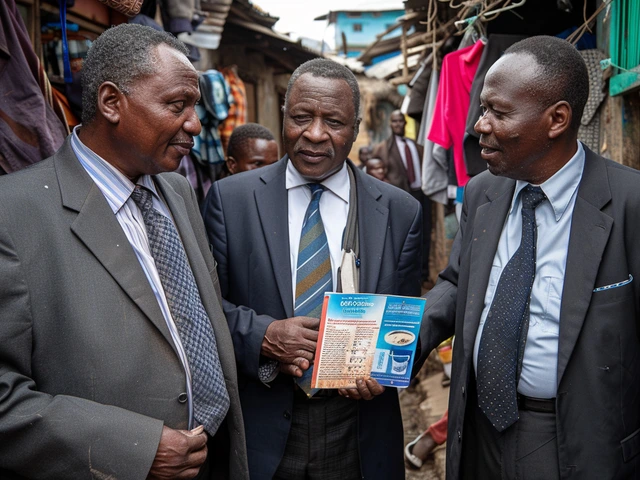So, you’re planning a trip to Ethiopia and you might be wondering if you can use your US dollars while you’re there. Ethiopia has a fascinating culture, stunning landscapes, and charming people, but its currency can be a bit of a mystery to new travelers.
First things first, Ethiopia’s official currency is the Ethiopian Birr (ETB). While the US dollar is widely recognized around the world, Ethiopia has its own set of rules and practices when it comes to foreign currency. Can you pay for a coffee or hop on a local bus with USD? Not quite. However, knowing how and where you can use your dollars will ensure you have a smooth journey.
- Official Currency and Exchange
- Where You Can Use USD
- Exchanging Money Safely
- Tips for Managing Money in Ethiopia
Official Currency and Exchange
Travelers heading to Ethiopia will quickly become familiar with the Ethiopian Birr, abbreviated as ETB. This vibrant currency comes in both coins and notes, with denominations that cater well to the needs of everyday transactions, from bustling markets to cozy cafes. Being aware of the local currency's nuances is key to a hassle-free trip in Ethiopia.
The current exchange rate for USD to ETB can vary, but as of recent figures, one US dollar usually fetches around 55 to 60 Ethiopian Birr. Rates can fluctuate due to market conditions, so it’s advisable to check for the most current rates before your trip. Most currency exchange services at hotels, banks, and authorized exchange bureaus in cities like Addis Ababa provide trustworthy services. Avoid street money exchangers as they might offer rates that are too good to be true, often with less-than-honest intentions.
One handy piece of advice is to bring newer series US dollar bills. Ethiopian banks and exchange services are very particular about the condition and series of the notes they accept. Old, torn, or marked bills might be outright rejected. Larger denominations like $50 and $100 bills often attract better exchange rates compared to smaller ones.
"Ensuring you have pristine dollar bills can save you a lot of hassle at exchange counters," says Maria Tedesco, a travel expert with years of experience in African travel.
Exchanging money at the airport might seem convenient, but rates there can sometimes be less favorable. It's often wiser to exchange a small amount at the airport for immediate expenses like a taxi fare and then head to a reputable bank or hotel for the rest. Additionally, while credit cards are increasingly accepted in high-end hotels and restaurants in major cities, many local establishments still operate on a cash-only basis. Hence, carrying local currency in smaller denominations is a practical move.
When traveling through rural parts of Ethiopia, having enough cash in hand becomes even more crucial as ATMs and exchange services can be limited or non-existent. Speaking of ATMs, international travelers should ensure their cards are compatible with Ethiopian ATMs. Informing your bank about your travel plans can prevent any surprise blocks on your card due to unusual foreign activity.
Last but not least, keeping your exchanged money receipt is useful. In some cases, it’s required to convert leftover Birr back to dollars when you leave the country. Planning your finances around these aspects ensures you enjoy Ethiopia’s wonders without any monetary missteps.

Where You Can Use USD
Traveling with US dollars in Ethiopia can be a bit tricky. The first thing to understand is that while the Ethiopian Birr (ETB) is the official currency and is required for almost all transactions, there are specific circumstances where your *USD* can come in handy. High-end hotels, certain tourist attractions, and some souvenir shops in major cities like Addis Ababa and other popular tourist destinations are more likely to accept US dollars. However, it's always best to ask beforehand to avoid any confusion at the moment of payment.
Many upscale hotels that cater to international travelers will happily take your *USD*. These places usually provide a receipt in both USD and Birr for your reference. What's even better, some high-end hotels offer better exchange rates compared to local banks or currency exchange offices. A pro tip here is to always carry small denominations, as larger notes can sometimes be a fuss.
"I've found that carrying a mix of small and medium denominations of USD saved me from any unwanted currency hassles," says John Smith, a seasoned traveler who has been to Ethiopia multiple times.
When it comes to tourist attractions, especially those visited frequently by international tourists, USD is often accepted. For example, key historical sites like Lalibela or the Simien Mountains might have souvenir shops or tour operators that are willing to take US dollars. But this isn't a rule; check before making any plans to ensure you're well-prepared.
If you're into shopping and looking to buy souvenirs in local markets, having some Birr on hand is essential. However, for those eye-catching Ethiopian coffee or traditional scarves sold in tourist hotspots, USD might be accepted. But, if the vendor isn't keen on foreign currency, don't expect to haggle successfully with just dollars.
Another situation where your *USD* might be useful is tipping. Tipping in USD is appreciated in many cases, especially in tourist-heavy locations. Although Ethiopian Birr is preferred, the staff at hotels, restaurants, and tour guides are usually happy to receive tips in any currency. Frequent travelers suggest preparing small denominations of both Birr and dollars to handle this seamlessly.
On a final note, always make sure your dollars are in good condition. Ethiopian vendors and businesses can be quite particular about the state of the bills they receive. Any tears, excessive wear, or markings might lead them to refuse the money. Ensuring your bills are clean and crisp can save you a lot of headaches.
So, while Ethiopia may have its own currency, there are specific scenarios where USD can be quite useful. Knowing where and when to use your dollars will not only make your trip smoother but also enrich your travel experience.

Exchanging Money Safely
When traveling to Ethiopia, exchanging money safely is a top priority. The Ethiopian Birr is the only legal currency in the country, so understanding how and where to exchange your USD can make your trip hassle-free. Upon arrival, you will find several options for converting your dollars into Birr.
The most reliable place to exchange money is at authorized banks and hotels. Major banks like Commercial Bank of Ethiopia (CBE) and Dashen Bank have branches in cities and provide safe and transparent currency exchange services. Hotels, especially those catering to tourists, often offer exchange services, though the rates might be slightly less favorable compared to banks.
While airport exchange counters are convenient, they tend to have higher rates. It’s advisable to exchange a modest amount upon arrival for immediate needs—transport, meals, and minor expenses—and then find better rates in the city. Make sure to request some smaller denominations, as it can be challenging to get change for larger notes, especially in rural areas.
Beware of black market exchanges. Though the rates may seem attractive, they come with significant risks, including counterfeit currency and potential legal issues. Always exchange your money at legitimate places to avoid these problems. Ethiopia has strict laws regarding currency exchange, so it’s essential to keep your receipts after every transaction. These receipts are necessary if you want to exchange Birr back to USD when you leave the country.
In terms of safety, be discreet when handling money. Larger cities will have more secure venues, but this advice goes double for rural areas or crowded markets. Thieves can target tourists, and being cautious mitigates this risk. As an extra precaution, it’s wise to split your money into different wallets or pouches and not to carry all your cash in one place.
According to a traveler’s survey by TripAdvisor, 85% of tourists recommend using a combination of cash and card for spending in Ethiopia. While cards are increasingly accepted in major establishments, cash is king in local markets, small restaurants, and rural settings. To ensure a smooth stay, ensuring you have enough Ethiopian Birr for daily needs while still having access to emergency funds via a credit card or travel card is the ideal approach.
“The peace of mind that comes from knowing your money is safe cannot be overstated. Always use authorized places to exchange currency to avoid potential scams and issues,” advises travel expert Michael Palin.
Lastly, keep an eye on the exchange rates before and during your trip. Websites like XE or OANDA offer live updates on currency rates, helping you to determine the best time to exchange your money. Familiarize yourself with the look and feel of the Ethiopian Birr to avoid any hiccups during your transactions.

Tips for Managing Money in Ethiopia
Managing money in Ethiopia can be a bit different from what you might be used to in other countries. The Ethiopian Birr is the official currency, and it's what you're going to need for most transactions. While credit and debit cards are becoming more widely accepted in larger cities and hotels, cash is still king in many parts of the country.
First and foremost, when you arrive in Ethiopia, it's a good idea to exchange some of your USD for Birr at a reputable place. You can do this at the airport, although the rates might not always be the best. Banks and authorized exchange offices, known as Forex Bureaus, often provide better rates. Avoid exchanging money on the street to prevent getting counterfeit bills.
When carrying cash, it’s safest to have a mix of small and large denominations. While larger bills make it easier for significant payments (like hotel bills), smaller bills are essential for everyday expenses such as buying a drink, tipping, or paying for transportation. Keeping your cash secure is vital too. A money belt or hidden wallet can be useful to safeguard your money from pickpockets.
ATMs are available in many Ethiopian cities, but they are not as common in rural areas. Make sure to withdraw money when you have the chance in cities. It’s also wise to let your bank know you’ll be traveling to Ethiopia to avoid any issues with withdrawing cash. Some ATMs might not accept certain foreign cards, so it’s helpful to have a backup plan, like carrying extra USD for emergency exchanges.
Consider the costs of currency conversion and transaction fees. These can add up quickly, eating into your travel budget. Some banks offer travel-friendly accounts with low or no fees for international transactions, so it might be worth exploring these options before your trip.
Another point to note is that while larger hotels and upscale restaurants in Addis Ababa might accept credit cards, elsewhere you should be ready to pay in cash. Even if card payment is available, there might be service interruptions, and cash will always be a foolproof backup.
Here’s a tip: always have an understanding of the exchange rate. Knowing this will help you roughly calculate prices and ensure you’re not overpaying for goods and services. Apps like XE Currency are handy tools for real-time exchange rate conversions.
Finally, tipping is customary in Ethiopia. While it’s not mandatory, it’s appreciated by service staff. A little bit of cash can go a long way in showing your gratitude. Hotel staff, guides, and drivers often rely on tips to supplement their incomes, so having small bills ready can be quite helpful.
"One US Dollar equals around 54 Ethiopian Birr as of August 2024. While this rate fluctuates, keeping track can help ensure you get the best value for your money," advises an experienced travel blogger specializing in African destinations.
To wrap it up, managing money in Ethiopia involves a bit of preparation and caution. By planning your currency needs, staying informed, and carrying a mix of cash and cards, you can comfortably navigate your financial transactions throughout your trip.

 Quality of Life and Salary Conditions in Ethiopia
Quality of Life and Salary Conditions in Ethiopia
 How Foreigners Can Own and Start a Business in Ethiopia
How Foreigners Can Own and Start a Business in Ethiopia
 Average Monthly Income in Ethiopia: A Detailed Analysis
Average Monthly Income in Ethiopia: A Detailed Analysis
 Top Ethiopian Products: From Coffee to Pulses
Top Ethiopian Products: From Coffee to Pulses
 Understanding the Minimum Salary in Ethiopia: Key Facts and Insights
Understanding the Minimum Salary in Ethiopia: Key Facts and Insights
Divyaa Patel
August 28, 2024 AT 17:34In Ethiopia, a crisp dollar sings louder than a crumpled note.
Larry Keaton
August 31, 2024 AT 01:07Welcome to the land of coffee and ancient history, where your dollars can be both a blessing and a hassle. First, know that the official currency is the Ethiopian Birr, and most locals will ask for it before anything else. That said, high‑end hotels and some tourist‑centric shops do happily accept fresh US bills, especially those in good condition. Bring newer series notes; old or torn ones are often rejected at banks and exchange bureaus. You’ll find exchange counters at the airport, but the rates there are usually worse than those in downtown Addis Ababa. Swap a small amount at the runway for a taxi, then hunt for a reputable bank or your hotel’s desk for the bulk of the exchange. Remember to keep the receipts-Ethiopia sometimes lets you convert leftover Birr back to dollars when you head home. ATMs are scattered in major cities but can be scarce in the countryside, so plan your withdrawals wisely. Inform your bank about your travel plans so they don’t block your card mid‑trip. Credit cards are becoming more common in upscale places, yet cash reigns supreme in markets, local eateries, and rural areas. If you’re tipping, a few crisp dollars are appreciated, but small Birr notes are usually more convenient. Always guard your cash; split it between a wallet and a hidden money belt to thwart pickpockets. Avoid street‑side money changers; their rates may look tempting, but counterfeit risk is high. Keep an eye on the exchange rate via XE or OANDA so you know when you’re getting a fair deal. Finally, enjoy the scenery, the hospitality, and the amazing coffee-just stay financially savvy and your Ethiopian adventure will be unforgettable.
Liliana Carranza
August 31, 2024 AT 15:01Great rundown, Larry! I love the tip about splitting cash between pockets-keeps the pickpockets guessing. Also, heads‑up on keeping receipts; I once got my leftover Birr back without a hitch. For anyone heading to the highlands, pack a few extra small bills; ATMs get shy up there. Safe travels, and may your coffee be as strong as your currency game.
Jeff Byrd
September 2, 2024 AT 17:01Oh sure, because swapping money in Ethiopia is just a walk in the park, right? Just flash your crumpled dollars at the market and watch the vendors roll their eyes. Who needs reputable banks when you can gamble with street dealers? And apparently, every traveler forgets to inform their bank-what a surprise.
Joel Watson
September 3, 2024 AT 06:54While the sarcasm is noted, the reality is far more nuanced. Ethiopian banking regulations impose strict verification protocols, and unauthorized exchanges can constitute legal infractions. Moreover, counterfeit detection technology employed by licensed bureaus significantly mitigates risk. Therefore, adhering to authorized channels is both prudent and compliant.
Chirag P
September 5, 2024 AT 06:07As someone who’s visited Addis twice, I can attest that respectful interaction goes a long way. When you greet the teller in Amharic and present clean notes, the process is smooth. Also, carrying a discreet money belt reduces unwanted attention. Keep your documents handy, and enjoy the vibrant culture.
RUBEN INGA NUÑEZ
September 5, 2024 AT 20:01Absolutely, Chirag. I’ve found that notifying my bank before departure prevented a nasty block at the airport ATM. Also, using a travel‑card with low foreign‑transaction fees saved me a handful of bucks each week. Pair that with a reliable exchange bureau, and you’ve got a solid financial plan for Ethiopia.
Michelle Warren
September 7, 2024 AT 16:27This article is okay but kinda obvious. Everyone knows you need cash in Ethiopia, duh. The exchange rate stuff? Been there, done that. No big revelations here.
Christopher Boles
September 8, 2024 AT 06:21Even if the basics seem plain, it’s good to have them spelled out for first‑timers. Remember to check the current rate before you head out, and keep a small stash of dollars for emergencies. Small tips can make a big difference in remote areas.
Crystal Novotny
September 10, 2024 AT 00:01Dollar usage in Ethiopia is limited but not nonexistent
Reagan Traphagen
September 10, 2024 AT 13:54Of course, the government wants you to think the banks are safe. In reality, a hidden network of shadow exchangers siphons off tourist cash, and the official rates are a façade. Don’t trust the “authorized” bureaus-they're just a front for the same racket.
mark sweeney
September 11, 2024 AT 01:01Actually, the claim that all authorized bureaus are fronts is exaggerated. While irregularities exist, the Central Bank monitors exchange activities, and reputable institutions maintain transparent records. Blanket accusations ignore the nuanced regulatory framework.
randy mcgrath
September 12, 2024 AT 18:41Travel is as much about mindset as it is about logistics. When you approach currency exchange with curiosity, you discover the subtle economics that shape daily life. Each Birr note carries a story of the nation’s history, and your dollars become a bridge between cultures.
Frankie Mobley
September 13, 2024 AT 08:34Well said, Randy. I’d add that using a travel‑card can simplify transactions in hotels while still preserving cash for markets. Balance is key.
ashli john
September 14, 2024 AT 23:27Great points everyone! Keep your cash safe, know the rates, and enjoy the trip
Kim Chase
September 15, 2024 AT 13:21Totally agree, ashli. I always split my money between a front pocket and a travel pouch. It’s a simple habit that saves a lot of hassle later on.
David Werner
September 17, 2024 AT 01:27Don’t be fooled by the pleasant facade-there’s a covert agenda pumping the “official” exchange rates to siphon wealth from unsuspecting tourists. Every transaction is a data point feeding into the surveillance grid, tracking your movements and spending. Stay vigilant, and never trust the gleaming smiles of bank tellers.
Paul KEIL
September 17, 2024 AT 15:21While the conspiratorial framing is dramatic, the operational reality adheres to Basel‑III compliance, and foreign exchange desks operate under stringent AML/KYC protocols. The variance in rates reflects market liquidity and not a clandestine extraction scheme.